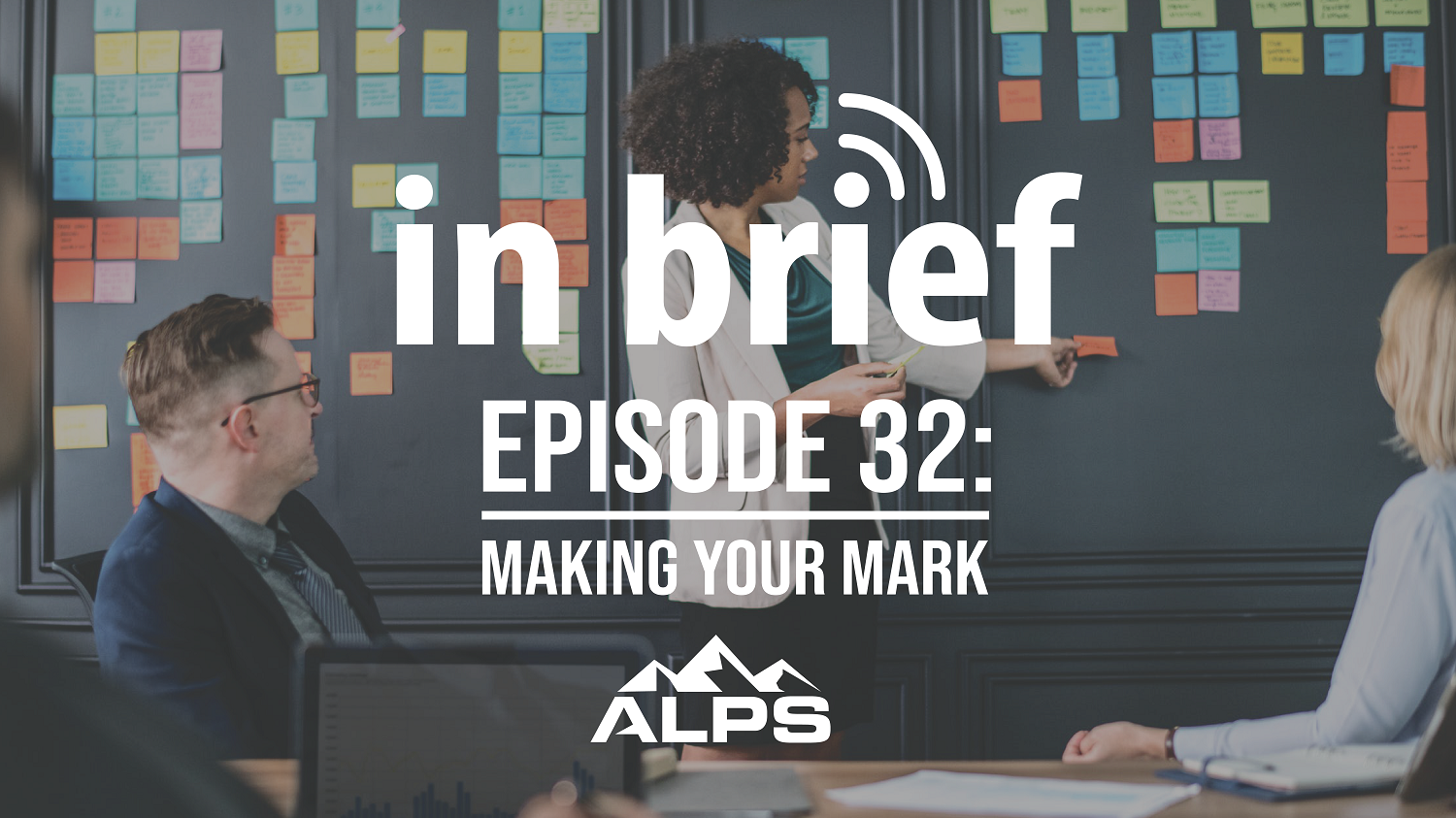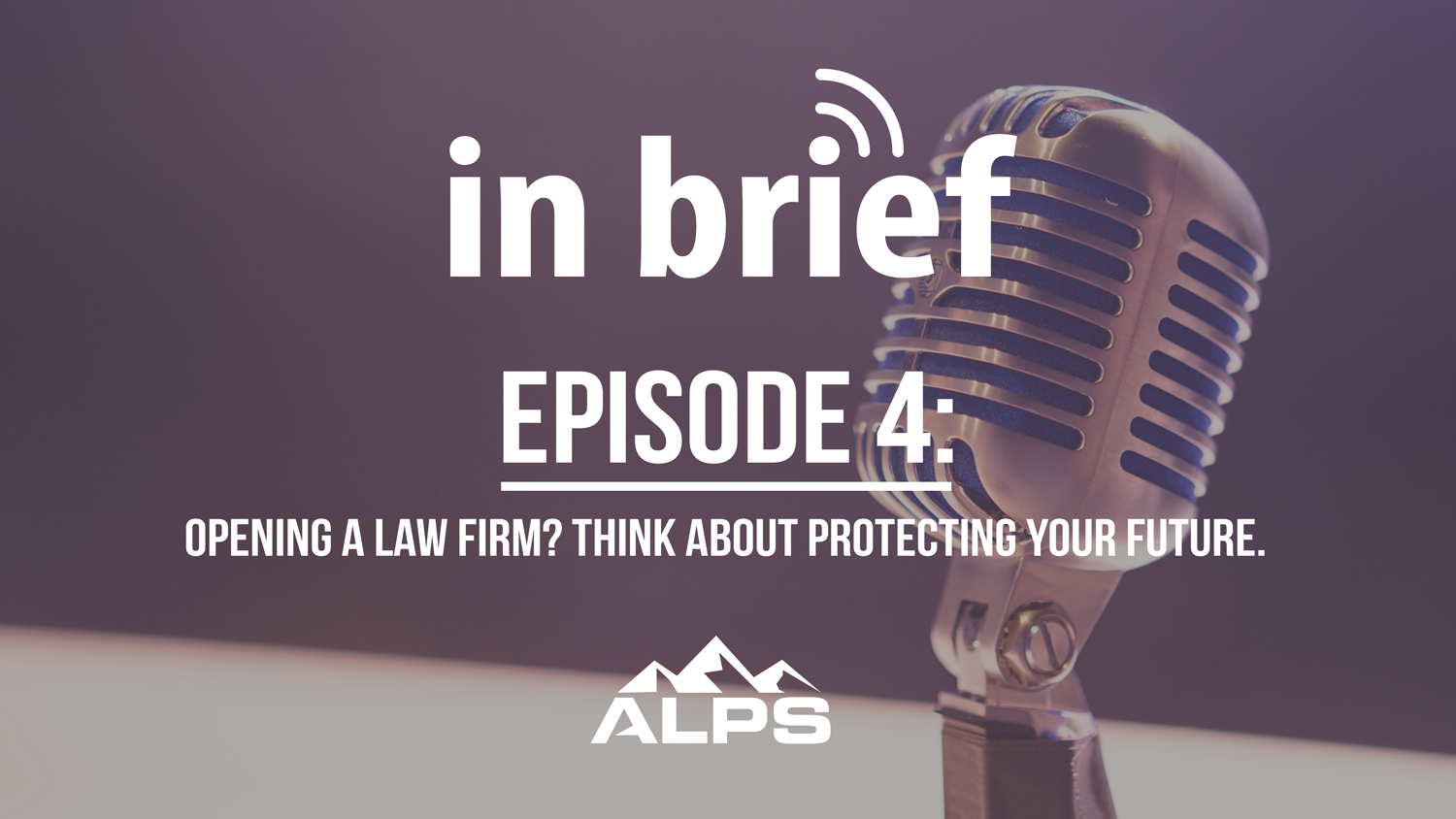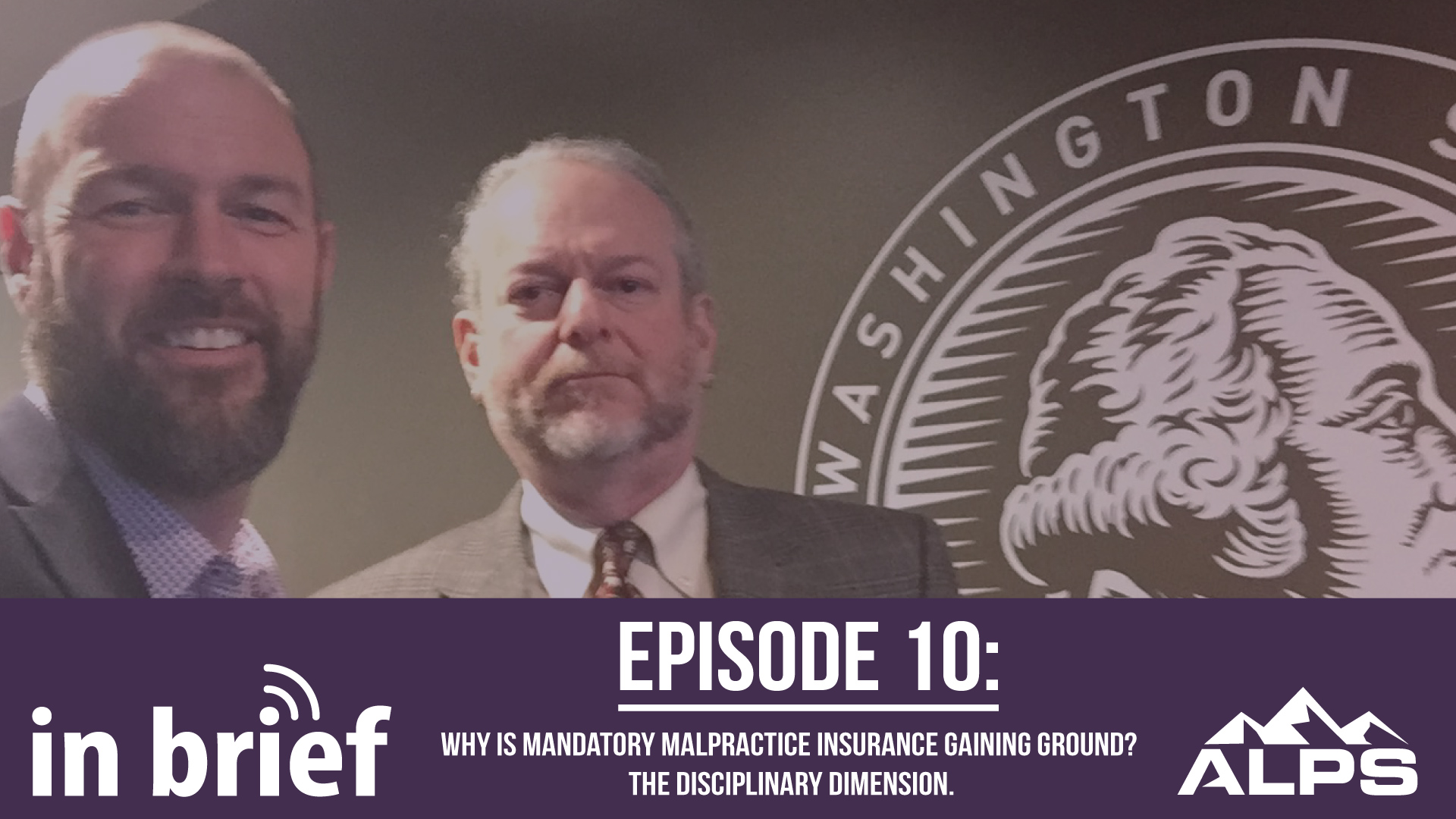6 min read
ALPS In Brief Podcast-Episode 4: Opening a Law Firm? Think About Protecting Your Future.
<span data-mce-type="bookmark" style="display: inline-block; width: 0px; overflow: hidden; line-height: 0;"...
We've crafted solutions tailored to your firm
The world of insurance for law firms can be confusing, and difficult to navigate. We've created this glossary because these common insurance terms should be easy to understand.
11 min read
 Mark Bassingthwaighte, Risk Manager
:
Apr 25, 2019 12:00:00 AM
Mark Bassingthwaighte, Risk Manager
:
Apr 25, 2019 12:00:00 AM

Trying to establish an advocate or mentor relationship as a woman in law? Andrea Canfield, president of the Anchorage Association of Women Lawyers and fifth-year Corporate Associate at Stoel Rives, offers advice and insights on how to successfully navigate a male-dominated practice group.
Transcript:
MARK B:
Hello. I’m Mark Bassingthwaighte, the Risk Manager with ALPS. Welcome to the latest episode of ALPS In Brief, a podcast that comes to you from the historic Florence building in beautiful downtown Missoula, Montana. I’m excited to be able to introduce today our guest, Andrea Canfield, who works with Stoel Rives, the Anchorage location. And Andrea, before we jump into our topic, and the topic, by the way, this is one of a series where we’re really looking at the broad issue of women in the legal profession. And so Andrea, before we jump into this topic, can you just take a little time and fill our listeners in on who you are? What don’t we know?
ANDREA CANFIELD:
Yes, no problem. Thanks, Mark, for having me. Yes, so my name is Andrea Canfield. I am a fifth year corporate associate at Stoel Rives. And by corporate, I do general corporate, but I specialize in mergers and acquisitions. I am in the Anchorage office, and I’m actually from Alaska. I’m from Eagle River. I went to college at Delaware State University for undergrad, and then for grad school got my master’s in business administration. And then went off to University of Virginia for law school. And then decided to come back to Alaska, so that’s just a little bit about me and how I ended up here.
MARK:
Very good. Thank you. All right, now I’m struck, you talk about being in the corporate M&A world, boy, that’s one that I think … My first response to that, this is heavily male-dominated. That would be my guess. Has that been a challenge for you? How is this working?
ANDREA:
Yeah, so I think you’re right. Most of the legal industry, as you know, is male-dominated, but especially in certain practice groups, and mine in particular. A lot of the CEOs that you’ll come across are men, a lot of the general counsel are men, and those are kind of my bread and butter for clients. And I think it works out in just … It’s a benefit and also kind of a burden. The benefit being that you stand out a little bit more, which means your work product stands out a little bit more, and you make a little more splash when you enter a room, and that’s just because you may be the only woman in the room. So I found that to be a benefit and something that really has helped me progress my career and also just the [inaudible 00:02:50] time in front of clients.
ANDREA:
The burden I think is the fact there’s sometimes a disconnect between what it really means to be in the legal profession and be a female, especially if you have children or especially if you have other interests outside that coincide with just the regular ideal of going to get a beer after work. So that’s been a bit challenging, but I think navigating it has been fun as well.
MARK:
And how does this impact the partnership track? Is being a woman in this setting, does that create its own challenges?
ANDREA:
Yes. And I think this is just general, across the board in all practice groups, but if you’re on the partnership track, which is what I’m on, you want to have advocators or those that are willing to speak on your behalf and really make sure that you enter the partnership, you hit the ground running. And I think it’s hard to find female advocates because there just aren’t very many of them. So you’re kind of left with being in a male-dominated industry or practice group, which I am in, and then also kind of being in a male-dominated pool of mentors. So you get on both ends just being surrounded by men.
MARK:
Got it.
ANDREA:
And I think that impacts. if you’re not comfortable in that sphere, it impacts the amount of contacts you can have with your mentors and those who are going to advocate for you when you go up for partnership. But I think as women we need to take a step forward and start embracing and kind of leaning into the fact that we do have male counterparts who are willing to speak up for us and take advantage of that.
MARK:
So if I were a woman and stepping into my first firm as an associate, what advice would you have in terms of trying to establish this advocate/mentor relationship? Do you have any thoughts about that?
ANDREA:
Yeah, I do. My primary mentor is a man. It’s a male partner, and he is great. And I would say that what I did for starting out was really take that relationship and make sure to really just focus on it and put a lot of time and effort into flourishing it. I think you should try as best you can if you’re a junior associate to really come in and talk with your partner, one, about the fact that your partner and mentor, one, about the fact that you are on the partnership track or whatever your end goal is at the time, and talk with them continuously and take them out to lunch, take them to coffee, ask to go get a drink or if you don’t drink to go get coffee or to go on a walk.
ANDREA:
I think that us women should take those relationships and not only take it as a, okay, this male mentor is going to look at my career and put me on that path, but they also need to know you. So take the time to know your mentor on a personal level, and don’t be afraid that because they are a male that it may be taboo. I think that right now in this social climate that we’re in, that’s [inaudible 00:06:28], but you have that because it really … if you can build a personal relationship with your mentor, your male mentor, you will be grateful for it in the long run.
MARK:
I think that is fantastic advice. As soon as you say it, it makes perfect sense, but I’m not sure I necessarily would have immediately thought of that. I tend to just think, “Oh,” and maybe this is because I’m male and I suffer from that syndrome perhaps. You sort of think, I often kid around with my wife about the difference between Mars being the male world and Venus. And Martians tend to be very competitive, and Venetians tend to focus more. And I think it’s a very positive thing. I really am trying to support what you’re saying here. But more about relationships. So when I think about that, looking at this male-dominated world that you’re in, in terms of colleagues and you’re sharing that many of the clients are also men and this competitive world, and it’s stereotypical a bit, but does that create problems or challenges in sense? Do you find a need perhaps to work harder than your male counterparts in terms of other associates on the partnership track? Does that come into play?
ANDREA:
I’m not sure it’s that. That’s a good question. I’m not sure if because I’m a female that I’ve had to work harder. I think that because I’m a female, I’ve had to work harder to let my accomplishments be known. I think females, and this is just a generalization, but I know I am guilty of it, we take our accomplishments and think that they will speak for themselves, when in fact, we should be advocates for ourselves and we should speak up and say that we’ve done this great thing or we’ve been a part of this great project or this great team. A lot of times we are not the first to speak for ourselves and we really need to take ownership of our successes and really let it be known to the world.
ANDREA:
So when we do come up for partnership or for a promotion or at the end of the year for bonuses or reviews, we shouldn’t be shy about saying, “These are the things that I’ve been doing over the year, and I’m doing great. I’m kicking butt.” And I’ve had to really own that as I’ve gotten more senior in my practice. And I think men just inherently do it a little bit easier, and I’m not really sure. I think that it has benefited them. And I think now as women we need to start doing the same.
MARK:
I like that, yeah, yeah. Can you talk to me a little bit about the challenges of building a practice as a woman in this male-dominated world? What’s your future longterm goal with your practice? And how are you trying to get there? What steps are you taking?
ANDREA:
Yeah, so I, like you said, I’m on the partnership track. My goal is to be a corporate partner specializing in M&A. And that means that I will have a lot of general counsel, a lot of CEOs, and executives as my clients. And I think right now I’m starting to do business development and really focus on that. And I’ve found that a lot of the things I did early on my practice have really helped. First being really responsive and being responsive from the beginning as far as how I want to create my practice. So if I’m okay with working weekends or having soft vacations, that’s what I call it, soft vacations, where I’m available for clients. But I need to make that known because that’s an added value to clients that may separate me from others.
ANDREA:
So I think that if you’re building your practice and looking to make your mark in a male-dominated industry or practice group, I think circling your practice around your strengths and really horn in on those from the beginning. I like to be available to my clients at all times, and I do carve out time to myself. And we can speak on that later, but that’s how I’m able to build a value brand, a value add to my clients. I will be the person that you can call on a Friday evening and I’ll be responsive and get something to you within reasonable time. So that’s one aspect of it.
MARK:
Again, thinking about someone just starting out, at the beginning of where you’ve come from, are there any mistakes, lessons, things that you might share, would you have changed anything?
ANDREA:
Oh my goodness, there are so many things. The number of mistakes, yes, yeah. There’s so much. Yes, so I would say if you’re starting out, the one thing that I wish I would have done differently is I think as lawyers we’re all kind of detail-oriented, but take that to the next level and be detail oriented and then ask questions that go beyond the details. That will increase your knowledge and that will also help you look at the big picture.
ANDREA:
So if a partner or a client gives you a document to review, that’s standard first-year stuff. Yeah, review that document, but ask questions if something doesn’t seem right, if things really aren’t adding up, or if there’s inconsistencies that you see. I think that I started to that a little bit later in my first and second year, but if I would have done that from the beginning, I just think there would have been a lot of mistakes I could have avoided. So yeah.
MARK:
Okay, all right. You’ve talked here a bit about being available quite a bit. And this is not a light practice that you have. There’s a lot of hours being devoted to this. You recently shared with me that you recently had a baby. Congratulations, by the way.
ANDREA:
Yeah, thank you.
MARK:
It’s exciting. I’m at the other end. We have five kids, but empty nesters now and really enjoying life in a different way. But love, love the time with the kids. But I start to think about, okay, you have a new baby, how are you managing to make this personal life work?
ANDREA:
Yeah. Good question. Two things, I outsource as much as I can, and I’m also finding I work at odd times. So for women who are just starting out and maybe thinking about having a baby, I would suggest finding a firm or partners or colleagues that really value you getting your work done by any means necessary, you don’t have to necessarily just be in the chair. You can work from home if you need to or you can work a little bit later in the night. So I take the early hours, so I work very early in the morning and then fairly late at night after the baby goes to sleep to kind of get in extra hours and get other things done.
ANDREA:
And as far as outsourcing, I tend to believe that if I have certain hours in the day, over the weekends, and some of them have to be spent to work, and then others are just spending with my husband and I, then I would rather spend the rest [inaudible 00:14:20] with my baby than cleaning dishes or doing laundry. So I try to outsource as much as I can. And I realize that that’s very privileged, you’re privileged and able to do that, and those who can’t, I would say then do as minimal as you can. Let the dishes pile up and focus on your baby for those time and you’ll get them done when you can. But that’s kind of how I make it work.
MARK:
I like that, okay. A final question that I have for you, and I think to some degree it relates to here what we’re still talking about in terms of how do you make this thing work? But wellness is a huge issue in our profession in terms of just I’m moving away from trying to talk about balance, finding balance between your professional life and your personal life. And I have found that that isn’t real helpful. And I like how the profession is moving toward really focusing on wellness as a preventative way. If we aren’t well in our life in general, living a healthy personal life, healthy professional life, that can create some problems. Thinking about wellness, what other thoughts do you have in terms of making this work? I’d just be curious.
ANDREA:
Yeah, no, great question. I’m glad you brought that up because I think we don’t put enough emphasis on it. So yeah, I go to the gym or do some physical activity every day at lunch unless I have a closing or something that’s just pressing. So I go the gym and I go for a run or I’ll lift weights or I’ll go for a walk and it’s another way, side point, that you could bring in business development by calling your clients and saying, “Hey, you wanna go for a walk? I’m at lunch.” Or calling another legal friend and you can continue your business development while also getting a little bit of fresh air and getting some exercise in.
ANDREA:
So I tend to believe that if I have to work 12 hours in a day, I can still find an hour to go to the gym because it just gives you that release and that breath and you feel like you’re not just working all the time, that you’re also enjoying life and getting yourself active. I find that it really will change your perspective. So I am a very big proponent of that, of exercise. I also am a really big proponent of taking the time to separate yourself and do some happy things even if it’s not just with your family. I try to spend a lot of time with my family, but if it makes me very, very happy to knit, I’ve joined a knitting group.
MARK:
I love it.
ANDREA:
And that is also a little bit of wellness, so I really love to read, so I can join a book club. And it could only be once a month or twice a month, but that time you’ll definitely … If you commit to it, you will find that you are so much more centered. And as far as work/life balance, I would call it a kind of blend, a work/life blend. Sometimes you’re really just trying to blend everything together and make it really, really smooth. And it’s not always smooth, but it will work. So that’s my idea on that.
MARK:
Well, Andrea, it’s been wonderful having some time to get to know you and chat here a little bit. I want to thank you for honoring me and giving us a little bit of time here. Before I let you go, do you have any final thoughts that you would like to share with our listeners?
ANDREA:
Yeah, so my one hopefully inspiration for all those women who are either entering into the legal profession or kind of in it and trying to find their way, I would say be very, very open and honest with your community, your tribe, your village around you, and let them help you. Bounce off ideas as far as the development or your mentor relationship, let them know what your goals are and others will help you. And I tend to gain the most success in my career by letting others in and really helping them to help me. So that’s my one tip for all those women out there.
MARK:
Well said. I appreciate that. All right, well, for those of you listening, I hope you found something of interest, and appreciate your taking the time to listen in with us. As always, if you have other topics of interest or other folks you’d like to hear from, please let me know, and we’ll certainly do what we can to make it happen. You may reach me at mbass@alpsnet.com. Again folks, thanks for listening. Bye-bye.
—
ANDREA CANFIELD was raised in Alaska and graduated from Eagle River High School in 2007. Andrea attended Delaware State University and graduated with a B.A. in Political Science in 2010 and an M.B.A. in 2011. She received her J.D. from the University of Virginia School of Law in 2014. Andrea is currently an associate at Stoel Rives LLP, working with the Corporate group. Andrea’s practice involves providing advice on general commercial transactions and private securities offerings, with a particular focus on counseling Alaska-based clients in mergers and acquisitions. Before joining Stoel Rives, Andrea was a summer associate at Lane Powell PC in Anchorage (Summer 2012) and a clerk at McGuire Woods LLP in Charlottesville, Virginia (Winter 2012).
ALPS In Brief Podcast Intro/Outro Music: Walk In The Park by Audionautix is licensed under a Creative Commons Attribution 4.0 license. https://creativecommons.org/licenses/by/4.0/
Artist: http://audionautix.com/
Since 1998, Mark Bassingthwaighte, Esq. has been a Risk Manager with ALPS, an attorney’s professional liability insurance carrier. In his tenure with the company, Mr. Bassingthwaighte has conducted over 1200 law firm risk management assessment visits, presented over 600 continuing legal education seminars throughout the United States, and written extensively on risk management, ethics, and technology. Mr. Bassingthwaighte is a member of the State Bar of Montana as well as the American Bar Association where he currently sits on the ABA Center for Professional Responsibility’s Conference Planning Committee. He received his J.D. from Drake University Law School.

6 min read
<span data-mce-type="bookmark" style="display: inline-block; width: 0px; overflow: hidden; line-height: 0;"...

9 min read
ALPS Executive Vice President, Chris Newbold, recently sat down with Doug Ende, the Chief Disciplinary Counsel at the Washington State Bar...

3 min read
As with so many tech decisions lawyers face, the answer is yes, as long as any associated ethical issues are identified and responsibly addressed....